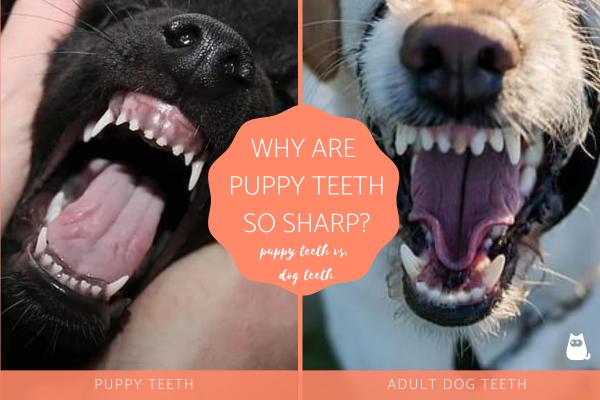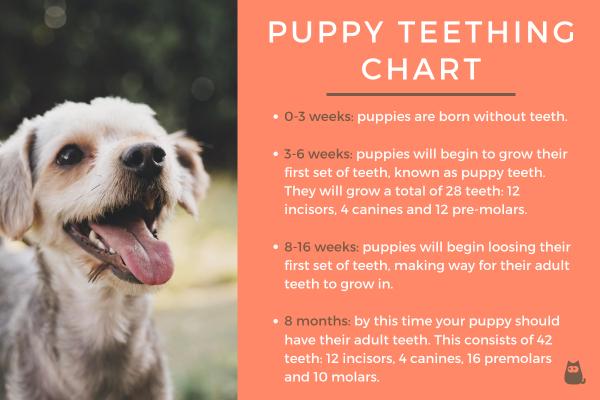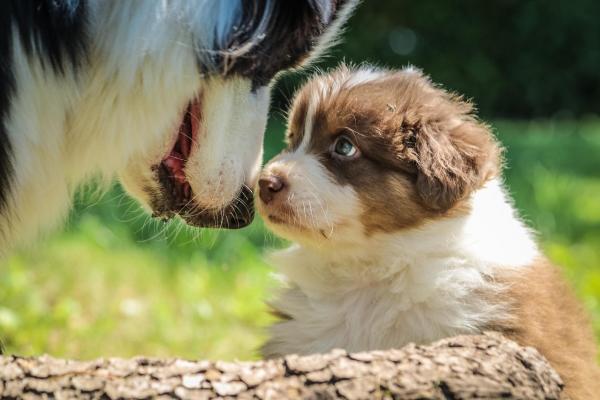
Puppies start to grow their temporary teeth around the age of 3 weeks. This is when they'll start weaning and playing with chew toys. But, why are their teeth so sharp?
In this AnimalWised article we're going to tell you why puppy teeth are so sharp. We'll also go through the difference between puppy teeth and an adult dog's teeth, the teeth development of your puppy and more. Keep reading to learn more!
Why are puppy teeth so sharp?
Puppies will begin growing their temporary teeth around the age of three weeks. This stage is very important in a puppy's life as they will begin to be more independent and self-aware. For example, puppies will socialise with their family and their caregivers, they will begin to eat solid food and they will be more conscious of how hard their bite can be.
If your puppy is going through this stage you must've realised how sharp their teeth are. Perhaps you were playing with them and they bit you. However, they didn't realise how hard their bite was. After all, it is their first time having teeth in their mouth.
So, why do puppies have sharp teeth? There are a number of different reasons as to why puppies need sharp temporary teeth. The most important one is weaning. Around the time their first teeth start growing, puppies will begin weaning off their mother's milk. The mother will begin to avoid feeding them as their teeth will hurt her nipples.
Therefore, puppies will begin to shift their diet towards a solid food diet. That's when their new sharp teeth will come into play. Puppies don't have strong jaws yet, therefore, they will need their little sharp teeth to help them chew solid food and wean off their mother's milk.
Another reason intertwined with weaning is biting. As we've said, due to their biting, their mother will force them to begin weaning. She's not the only one that will notice how sharp their teeth are. Their siblings will also notice when they're playing around.
This is when your puppy will start learning how hard their bite can really be, as their play mates will squeal and withdraw when bitten too hard. Your puppy will then understand that they need to be less rough with their biting when playing. Lastly, to cope with the pain of their teeth growth, puppies will need plenty of chew toys. If not, they will find other things to bite, such as furniture.
During their puppyhood, their small teeth will be sharp but their jaws will be weak. Once they're adults, they will have strong teeth (not as sharp as their puppy teeth) and stronger jaws. But they will know how to control their bite and be more self-aware. With proper socialisation and training, your puppy will grow to be a well-behaved and balanced tempered adult dog.
Puppy teeth development
Puppies are generally born without any teeth. Their first set of teeth, known as milk teeth or puppy teeth, come in when they are around 3 weeks of age. From then on, they will go through a series of changes as they loose this set and grow their adult teeth. To simplify, this is the outline of a puppy's teeth development:
- 0-3 weeks: puppies are born without teeth.
- 3-6 weeks: puppies will begin to grow their first set of teeth, known as puppy teeth. They will grow a total of 28 teeth: 12 incisors, 4 canines and 12 pre-molars.
- 8-16 weeks: puppies will begin loosing their first set of teeth, making way for their adult teeth to grow in.
- 8 months: by this time your puppy should have their adult teeth. This consists of 42 teeth: 12 incisors, 4 canines, 16 premolars and 10 molars.

How to tell a dog's age by their teeth
Now that we learned how our puppy's teeth grow into their adult teeth, here's how you can know the age of a dog by observing their teeth:
- Growth of Permanent Central Incisors and/ or Permanent Intermediate Incisors: 2 - 5 months
- Growth of Permanent Corner Incisors and/ or First or Fourth Premolar: 4 - 5 months
- Growth of Permanent Canines: 5 months
- Growth of Permanent First Molar: 5 - 6 months
- Growth of Permanent Second Premolar and/ or Third Premolar: 6 months
- Growth of Permanent Second or Third Molar: 6 - 7 months
Puppy teeth vs. dog teeth
Puppy teeth and adult teeth are different for a number of reasons. They are as follows:
- Timing: puppy teeth come in when they are around the age of 3 weeks old, while adult teeth come in when they are around the age of 8 months old.
- They also look different: puppy teeth are small and short and adult teeth are bigger but less sharp.
- Amount of teeth: they differ in quantities too as puppy teeth have a total of 28 teeth and their adult teeth have a total of 42 teeth.
- Color: puppy teeth are more white, whereas adult teeth will have a yellow hue to their color.

Dental care for puppies and adult dogs
When it comes to caring for a dog, dental care is just as important as diet or hygiene. It's also important to understand that this care will be different when they are puppies and when they are adults. Let's go through their dental care needs:
Dental care for puppies
Puppies will need chew toys made for puppies of their age. We must be careful when choosing a toy for our pup as it may harm their puppy teeth or be made of toxic material. By choosing the correct chew toy we will help them relieve the pain they are experiencing as their teeth grown. We will also promote healthy dental growth for our little pup.
Going to the veterinarian during this period is also important so we can make sure everything is going well. If we detect any problems early on it will be easier and quicker to deal with. Lastly, we should brush their teeth with dog tooth paste or provide them with a chew toy specifically made for their dental hygiene.
Learn more in our article about the different ways of cleaning your dog's teeth.
Dental care for adults
Adult dogs will have less sharp teeth but a stronger jaw. Since their teeth are different to those of puppies, we will also need to adapt their dental care. For adult dogs we must also be careful when it comes to choosing the correct toys. For example, tennis balls can actually cause issues over time.
Adult dogs will also need to have their teeth cleaned. However, the most important factor is their diet. Make sure to stay away from highly processed commercial treats as they can cause dental issues and promote obesity. Instead, we should keep our dog's diet clean and balanced.
This article is purely informative. AnimalWised does not have the authority to prescribe any veterinary treatment or create a diagnosis. We invite you to take your pet to the veterinarian if they are suffering from any condition or pain.
If you want to read similar articles to Why Are Puppy Teeth So Sharp?, we recommend you visit our Other health problems category.